Gabart faces final tactical decision in record attempt
Published on December 12th, 2017
(December 12, 2017; Day 39, 22:30 FR) – The current pace by François Gabart will this week have him successfully set a new singlehanded round the world record. With just 2045.53 nm remaining, the skipper of the 30m MACIF trimaran has covered 715.6 nm in the past 24 hours and is now 2530.68 nm ahead of the record time.
Since he crossed the equator and entered the North Atlantic on December 10 after 36 days at sea, François Gabart has enjoyed high speeds, so much so that he crossed the doldrums without even slowing down, before bypassing the Azores high-pressure area by the west, a large area of flat calm, whose centre is positioned roughly over the Azores archipelago.
Since yesterday afternoon, he has encountered very difficult sailing conditions, a strong trade wind and a cross sea, meaning that the MACIF trimaran has been severely tossed about. “It’s quite difficult, as the sea is still rough,” said Gabart. “It’s been shaking me about since yesterday evening. It should calm down this morning, but there’s still 30 knots. Normally, the sea will no longer be coming at me from the right, which will mean I will be better aligned and things should be a little easier.”
In this weather, he is very careful about his trimaran, as he is very aware of the need to preserve it during the last week at sea. “You need to find the right balance between making sufficiently fast progress and not necessarily sailing at 40 knots, because that bashes her about. That’s part of what’s so difficult, but that’s my job. You learn to know how your boat feels. For the moment, everything is going well, but you never know when you cross the boundary between getting it right and getting it wrong. I hope to leave this area as soon as possible, and then I should be able to surf my way to the finish.”
With his estimated finish time now at five days faster than the current record of 49 days, 3 hours, 4 minutes and 28 seconds, even Gabart is surprised at the large margin. “I said before the start that it would be hard and to beat the record I would need three things in my favour: good weather, a good boat, and good sailing.
“Well the weather window was clearly wonderful. Even though it is looking harder at the end, and I am not going to go fast on the last three days, out of the 41 days so far, apart from the low-pressure area in the Indian Ocean, I have been pretty lucky. Then there’s the boat: she’s very fast and she’s also capable of maintaining speed over a long periods. I am very proud of all the work the team did beforehand. Lastly there’s good sailing: for the moment, I’m not going to brag, but I think that I’ve done a good job. Now, I hope that things will remain like this until the finish”.
Sailing at 30 knots in an east-northeast trade wind, MACIF continues to sail in a northerly direction around the high pressure in the Azores. By Thursday (Dec. 14) he should pass north of it, gybe and then set an easterly course for Brittany. The next step of the programme looks difficult, however, with a very big area of flat calm crossing his path.
“I don’t really have much choice. I’m going to have to be patient. It’s all part of the game, but it’s a little frustrating as I want to sail fast right to the finish. Admittedly, this is not the goal, but I would have liked to have finished with a time close to that of Francis Joyon with his crew (ie, 40 days, 23 hours, and 30 minutes last January during the Jules Verne Trophy).
“That’s not going to happen with the weather this way, but at the same time, when I see the big low pressure area you had these last few days, it’s probably best to finish in calmer weather and make sure I get there. The routings suggest that the finish time is virtually the same whether the boat sails fast or slow.”
The current ETA is Sunday afternoon (Dec. 17), which will be just over 43 days.
The key news of the round the world record
Date of departure: Saturday November 4, at 10:05 (French time, UTC+1)
Ouessant-Equator passage time: 05 d 20 h 45 min
Ouessant-Good Hope passage time: 11 d 20 h 10 min
Ouessant-Cape Agulhas passage time: 11 d 22 h 20 min
Ouessant-Cape Leeuwin passage time: 19 d 14 h 10 min
Ouessant-Cape Horn passage time: 29 d 03 h 15 min
Ouessant-Equator return: 36 d 01 h and 30 min
Equator-Equator passage time: 30 d 04 h and 45 min (new single-handed record)
Cape Horn-Equator passage time: 06 d 22 h and 15 min (new reference time outright)
24-hour distance record: 851 miles (Nov 14, 2017)
Team details – Tracker – Facebook
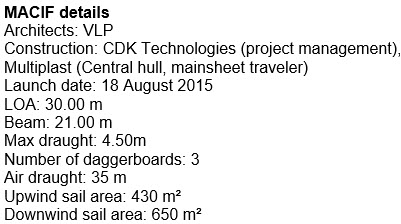 Only three sailors to date (Francis Joyon, Ellen MacArthur, Thomas Coville) have ever held the record. After his start on November 4, to beat the record of 49 days, 3 hours, 4 minutes and 28 seconds held by Coville since December 25, 2016, Gabart will need to cross the finishing line (between Créac’h lighthouse, in Ouessant (Ushant), and the Lizard Point lighthouse in Cornwall, England) before 13.09 on December 23 (French time, UTC+1).
Only three sailors to date (Francis Joyon, Ellen MacArthur, Thomas Coville) have ever held the record. After his start on November 4, to beat the record of 49 days, 3 hours, 4 minutes and 28 seconds held by Coville since December 25, 2016, Gabart will need to cross the finishing line (between Créac’h lighthouse, in Ouessant (Ushant), and the Lizard Point lighthouse in Cornwall, England) before 13.09 on December 23 (French time, UTC+1).


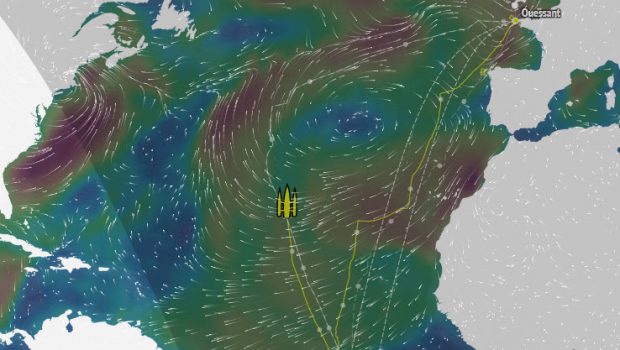


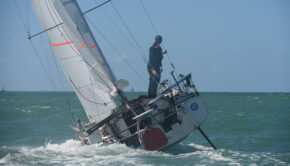
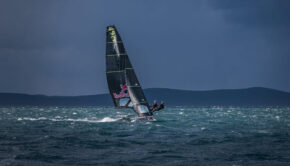

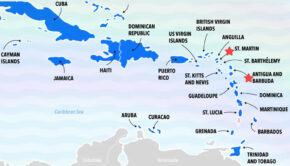
 We’ll keep your information safe.
We’ll keep your information safe.